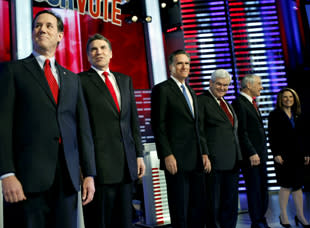 The Ticket
The TicketWhat now? Why the next 10 days are the most critical of the GOP campaign

Six months ago, political junkies were deriding this year's Republican presidential race as one of the slowest and least exciting nomination battles in recent memory. Mitt Romney looked hard to beat. Newt Gingrich's campaign appeared all but dead. And several key Republicans whom many party insiders had begged to run—including Chris Christie, Mitch Daniels, Mike Huckabee and Haley Barbour— opted out of the campaign.
Yet that boring Republican race has turned into one of the most unpredictable and chaotic presidential nominating contests in party history. With voting set to begin in a little over three weeks, the race now enters its most crucial phase. Republican voters in the early states will finally have to decide who they want to represent their party against President Obama.
The next 10 days will be the most critical of the campaign, as the candidates begin to make closing arguments to Iowans before most voters tune out the campaign during the Christmas holidays.
Newt Gingrich, who leads in the polls in three of the four early nominating states (Iowa, South Carolina and Florida--he trails only in New Hampshire), faces the most pressure. He must translate his surge in the polls into actual wins.
"If Gingrich can survive this week and next week, he may be OK," Warren Tompkins, an influential South Carolina-based Republican strategist, told Yahoo News. "All he needs to do is make it through that lull through the holidays."
The former House speaker largely fended off attacks from his rivals at Saturday's Iowa debate, sponsored by ABC News and Yahoo News. But the clashes hinted at Gingrich's biggest enemy: Gingrich himself.
His more than three decades in the public eye have already provided plenty of fodder for attack ads from his rivals, including Romney and Ron Paul. Scrutiny of Gingrich's record and his personal life—including two failed marriages that ended, in part, because he cheated—is likely to increase in coming days.
On Saturday, Gingrich coolly dispatched his rivals' attempts to attack his record. ("Let's be candid: The only reason you didn't become a career politician is you lost to Teddy Kennedy in 1994," Gingrich replied when Romney described him as a creature of Washington.)
For Romney, the stakes are equally high, as he is now in virtually the same position he was four years ago, when he was an early frontrunner for the Republican nomination but lost ground in the polls as the Iowa caucuses approached. In trying to contain Gingrich's surge, the Romney team is using the same playbook they used in 2008 when they tried to take down Mike Huckabee's insurgent candidacy, by carpet-bombing TV and radio with negative ads.
That approach backfired for Romney four years ago—and could do so again. Many Republican voters remain skeptical about Romney, polls show. For months, the race has been about voters looking for an alternative to the former Massachusetts governor, with Gingrich being the latest candidate to rise into that role.
If Gingrich falters, there are others who could step into his shoes. Rick Perry, who raised a lot of money before his campaign faltered this fall, is spending millions of dollars on TV ads in Iowa and seems to have finally found his footing in the debates—though it may be too late. Michele Bachmann and Rick Santorum are trying to fight not only for the divided support of social conservatives in Iowa, but also for Herman Cain's supporters, who are now looking for a new candidate in the race.
The biggest question mark in Iowa could be Ron Paul, who has steadily risen in the polls in the state in recent weeks and has been drawing the biggest crowds of the 2012 contenders there. Paul's candidacy has been dismissed by many mainstream Republicans, but he is second only to Romney in his ability to raise campaign cash, which makes him a very real player in the race.
Adding to the chaos and uncertainty of the primaries are factors that weren't in place four years ago, including super PACs that have already spent millions on TV ads to boost specific candidates and attack others. In New Hampshire, Jon Huntsman, a moderate Republican who is aiming for a surprise showing in the state, is being aided by a super PAC funded by his father.
The way the race looks today could be completely changed by the time voters head to the polls. Iowa and New Hampshire are home to voters who are known for being late deciders and for changing their minds at the last minute. In January, those voters could break for anyone.
Other popular Yahoo! News stories:
Analysis: Newt Gingrich survives his first big night of attacks
Yahoo! readers rate the debate: '$10,000 is more than some people make in a year'
Saint Paul: Inside Ron Paul's effort to convince Christian conservatives that he's their man
Want more of our best political stories? Visit The Ticket or connect with us on Facebook and followus on Twitter.
